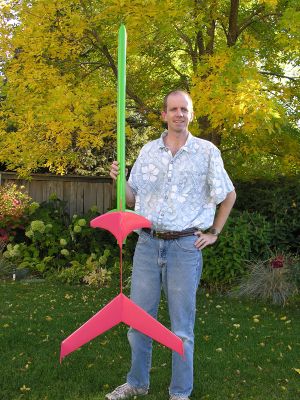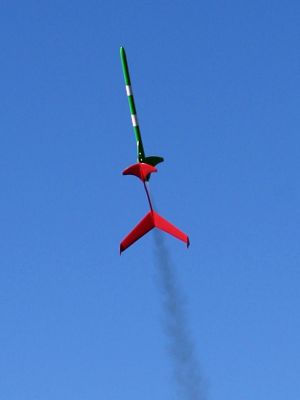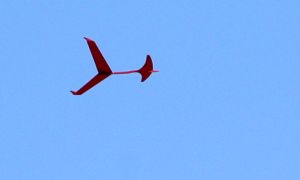Scratch The Flamingo Original Design / Scratch Built
Scratch - The Flamingo {Scratch}
Contributed by Geof Givens
| Manufacturer: | Scratch |

Brief:
The Flamingo rose from the ashes of the Albatross, which was my huge boost glider built
as part of EMRR Challenge 2007 and was destroyed near the end of its first flight when it glided into a freak crosswind
gust. After that setback, I decided to return to a much more stable glider design with a superior glide ratio aided by
a canard and a "smaller" two-foot wingspan.
The glider is 6 3/8oz, 30.5in tall including the sweep, with 22.5in wingspan. The boost pod is 43in tall, based on BT-60 tubing. It weighs about 12 oz. This is a 24mm design for E28 motors or better.
Construction:
I built the entire glider first. The body of the glider is 1/8in basswood with a layer of 6oz S-weave fiberglass on
each side. The wings and wing tips were cut from the 3/8in balsa remains of the Albatross wings. These were sanded
thinner for reduced weight and given a better airfoil.
The glider is designed to be mounted so that the attack angle the main wings is zero (i.e., the wing surface is parallel to the booster body tube). For this to work: A) the attack angle of the canard will not be zero, and B) the glider must be positioned on the pod so that it is exactly at the CG of the glider/pod unit. The second requirement is needed so that the canard's non-zero angle of attack won't send the rocket into an arcing boost. Both the canard and wing are slid in to angled slots cut in the glider fuselage.
The shape of the fuselage has an unusual curve. Not only does this help with the canard and wing alignment, but it also enables the wing to hang more directly under the rocket while providing sufficient space so the glider wing and body are not burned by the engine blast. It is also this curving fuselage that allows both the wing and canard to be feathered into the fuselage at an angle, giving it a smooth, futuristic look.
The ideal CG of the glider is slightly in front of the rear wing. I achieved this by carving some holes in the canard and epoxying in some washers. Then this area was filled with putty and sanded smooth. Unfortunately, the epoxy added too much weight, so I had to dig out the washers and re-fill with just epoxy and putty. It seems I need a better way to pre-estimate the epoxy weight.
The trimming was quite successful though. On my first toss, it went so far it almost hit the backyard fence so I took it up to the local school and easily got 50 or 60 yards of glide from a hill that couldn't be much more than about 10 feet tall.
The mounting system for the glider uses the pin and notch strategy. The pin was formed from a bolt with the head ground off. The pin is set into the mounting bracket and fits a notch cut in the glider fuselage. The mounting bracket was three layers of 1/8in basswood with the middle layer fiberglassed on both sides to match the thickness of the glider fuselage. After assembly, I feared that the mounting bracket was quite heavy, so I drilled five holes of varying diameters to reduce weight. It looks pretty cool, too.
 The boost pod body tube was constructed from the boost pod that used to serve my upscale
Groovy Katt glider. I stripped off the old
mounting bracket and gave the whole thing a nice new coat of Elmer's Fill 'n' Finish and primer. Two fins, each at 135
degrees off from the mounting bracket, were added for even better boost stability. These fins were shaped to mimic half
the canard.
The boost pod body tube was constructed from the boost pod that used to serve my upscale
Groovy Katt glider. I stripped off the old
mounting bracket and gave the whole thing a nice new coat of Elmer's Fill 'n' Finish and primer. Two fins, each at 135
degrees off from the mounting bracket, were added for even better boost stability. These fins were shaped to mimic half
the canard.
Finishing:
My daughter had a lot of influence on the paint colors and glider name. The boost pod is Duplicolor Ceramic Enamel
Grabber Green. The glider is Rustoleum Painter's Touch Watermelon. Wal-Mart Clear went over the top of everything.
Flight ad Recovery:
First flight was on day 1 of NCR's Oktoberfest 2007. I used the ideal motor: E28-4. Boost was swift and straight with
only slight arcing. Unfortunately, the chute never made it entirely out of the tube, snagging just inside the lip.
Thus, the glider never separated and the whole assembly came down ballistic as one unit. Amazingly, the glider simply
separated when the pod nose hit and lawn darted separately into the prairie mud. I yanked it out to find it totally
unblemished!
 I took it home that night and wiped the mud off. To repair the boost pod, I cut off the top two inches
patched a couple of tube dimples. The whole thing was ready to fly again on day 2 of Oktoberfest. That morning,
however, I discovered that shortening the boost pod had removed the old Estes-style shock cord mount so during
breakfast I hastily epoxied in another before heading out to the prairie. This repair proved to be too hasty as it
pulled loose at ejection after a great boost on another E28-4. The nose floated down gently on the 27in nylon chute
(with 4 in spill hole) while the pod plummeted. Luckily the pod again suffered only a few more dimples which have
already been repaired.
I took it home that night and wiped the mud off. To repair the boost pod, I cut off the top two inches
patched a couple of tube dimples. The whole thing was ready to fly again on day 2 of Oktoberfest. That morning,
however, I discovered that shortening the boost pod had removed the old Estes-style shock cord mount so during
breakfast I hastily epoxied in another before heading out to the prairie. This repair proved to be too hasty as it
pulled loose at ejection after a great boost on another E28-4. The nose floated down gently on the 27in nylon chute
(with 4 in spill hole) while the pod plummeted. Luckily the pod again suffered only a few more dimples which have
already been repaired.
However, this shock cord failure occurred after ejection, which meant that the glider got way up high and separated successfully. Fantastic! The flamingo enjoyed a nice lazy flight over the prairie and the NCR Oktoberfest audience before settling in for a smooth, gentle landing. I'm looking forward to the next flight, hopefully completely glitch-free.
 |
 |